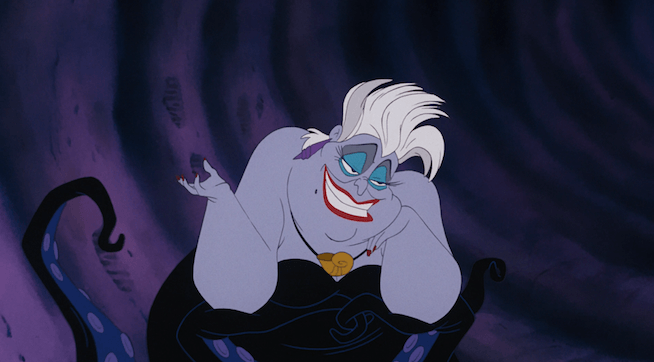
Ursula doesn't give a single fuck. Not one. (Also we don't own Ursula. Disney does. Image credit: Walt and his many lawyers.)
The Study has proven: All that is required to maintain long-term weight-loss is to maintain long-term weight-loss.
CW: diet, ED, weight loss
I once lost more than 65 pounds, so, essentially a 7-year-old child. I lost 65 pounds by engaging in a variety of disordered behaviors which included, but were not limited to point counting (shoutout to Weight Watchers for assigning every food a point value, and ruining cheesecake for half the population), restricting calories, exercise bulimia, laxative abuse, and you get the point. It took me about seven months to lose that first-grade child, which I promptly gained back, with interest.
So you can imagine my relief when I learned from this study, that there is indeed hope for all of us fatties and our obviously grim futures. The Study has proven: All that is required to maintain long-term weight-loss is to maintain long-term weight-loss.
Well TYVM Captain Obvious.
This Very Scientific Study (aka “Successful weight loss maintenance includes long-term increased meal responses of GLP-1 and PYY 3-3”) goes deep into your empty refrigerator to prove that after a year of a “precise” diet, participants bodies were found to produce less of the hormone Ghrelin (the hunger signaler) and more of the hormone GLP-1 (the “I don’t need food” signaler).
I don’t know about you, but “Precise Diet” sounds like an awesome way to spend the next 40 years of my life.
To summarize: 1. Scientists put 20 “obese” (whatever that means) people on a “very low-calorie” diet (which sounds awesome) 2. This “very low-calorie” diet resulted in a weight-loss average of 28 pounds in eight-weeks. 3. Post “Very Low-Calorie Diet,” the participants were then put on (or, more accurately, subjected to) “Precise Diet” and behold, at the end of 52 weeks they had maintained their 28-pound weight loss (more or less).
This incredible weight-loss maintenance is credited to the hormones shift I mentioned up there.
Revolutionary.
There is a name for this maladaptive behavior in infants, “content (happy) to starve.” Some infants who suffer inadequate caloric intake will cry in hunger, and when their hunger is not resolved (after a prolonged period), they will basically give up. They will appear “content” because starvation is all they know. Probably also something with their bodies just thinking the end is nigh. But I’m no scientist.
The name for the similarly maladaptive behavior in adults will henceforth be known as “Successful weight loss maintenance includes long-term increased meal responses of GLP-1 and PYY 3-3.”
We’ve already proven that significant weight loss is nearly impossible to maintain — only about 2% of us will. And we’ve already proven that calorie restriction acts as a metabolism reset button, warning your body of a potential famine, and begging it to hold on to every calorie it can — a minute on your lips, forever in your famine-ready fat-stores.
Let me sum this study up for you: Congratulations, if you starve yourself long enough, you won’t be hungry anymore.
Are these scientists bored?
That’s not a “diet” or a “healthy lifestyle.” That is literal starvation. We see this in people suffering from anorexia, an eating disorder that up to 4% of women will suffer (and 3.9% of those people will die from complications of the disorder). The absence of hunger is not a celebratory event.
Diets fail for a reason, and that reason is: Your body is not meant to starve.
Hunger pains exist because hunger is actually necessary for survival. If you limit your calorie intake for a year, you’ll have maintained your weight loss, right up until week 53, when you start eating normally, and your body starts storing that cheesecake right where it can find it the next time you subject it to “Very Low-Calorie Diet."







